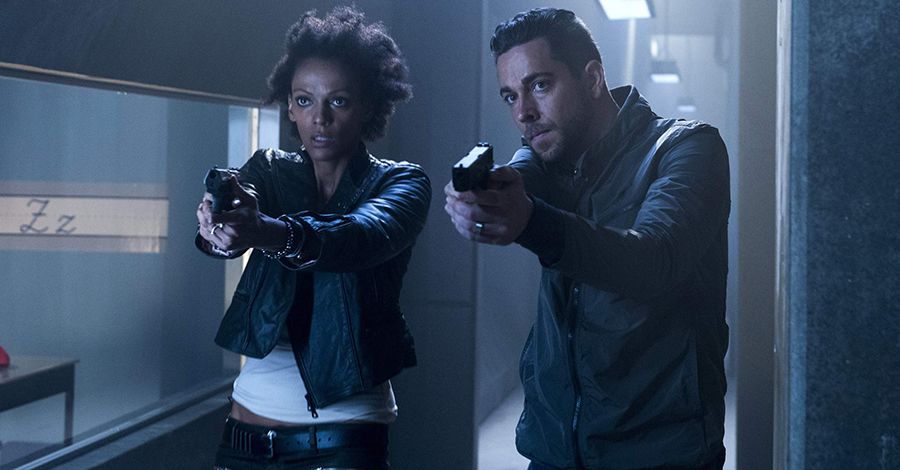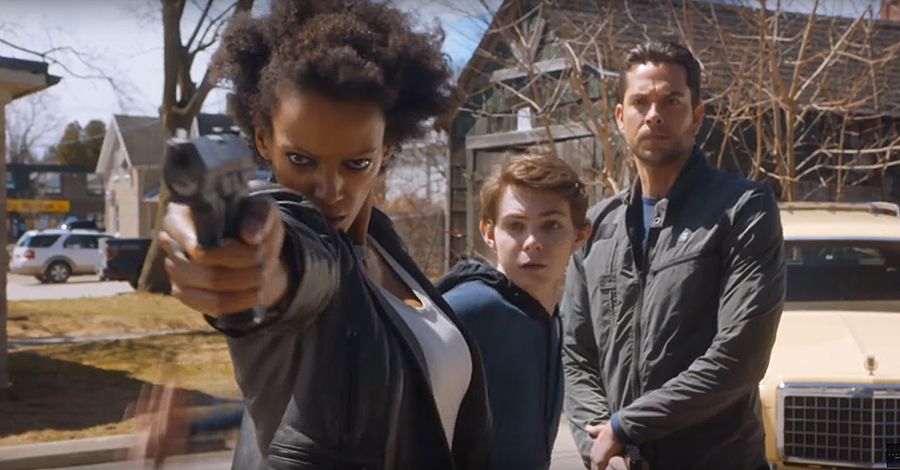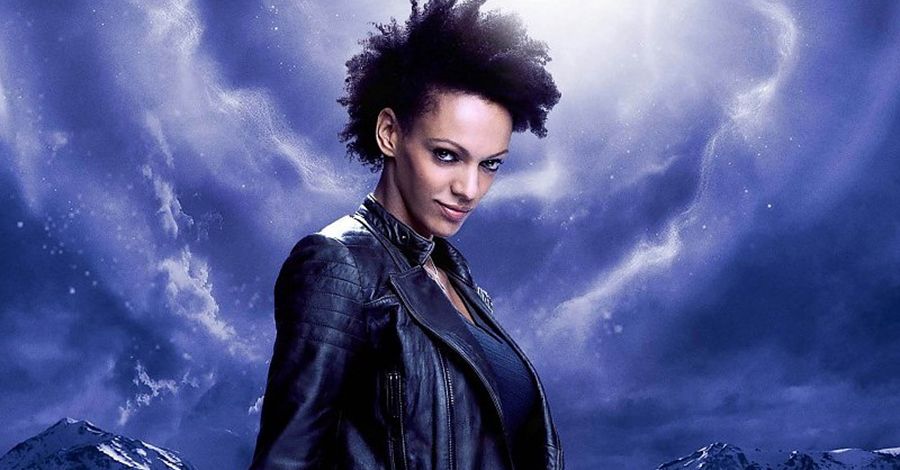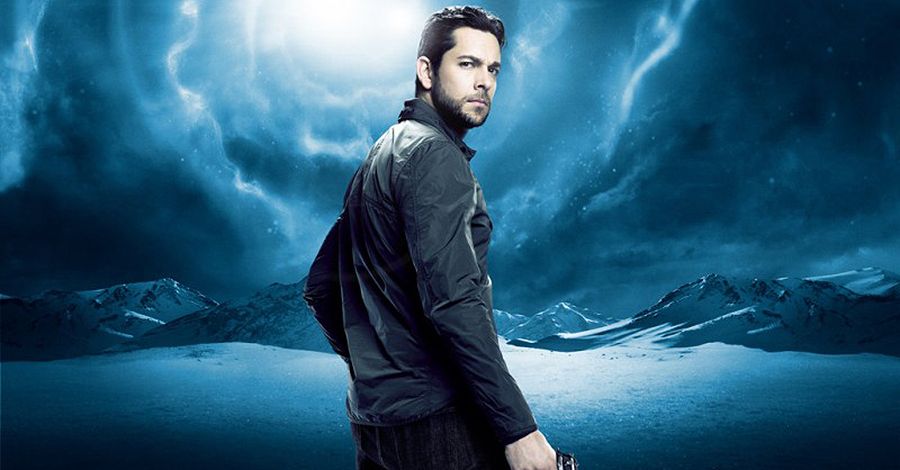In the backroom of The Grill on the NBCUniversal lot, a casually dressed Zachary Levi -- sporting a long-sleeved blue checkered shirt, shorts and a baseball cap -- arrived and greeted the small group of reporters gathered together to discuss the new 13-episode miniseries event "Heroes Reborn." He looked over the menu while chatting about which parties he attended after the Emmy Awards and the absurdly warm LA weather before being joined by his "Heroes Reborn" co-star Judith Shekoni -- Levi's onscreen "lovely and talented TV wife" in the miniseries.
Obviously both friendly and positively delighted with each other's company -- immediately joking about Levi's attempts at accents -- the two sat in stark contrast to their "Heroes Reborn" characters, a husband-and-wife duo out for vengeance and blood that have clearly drifted apart from one another during their quest for revenge.
For a moment, members of the press that had seen the first "Heroes Reborn" episode couldn't help but flash back to the two's extreme onscreen introduction, as it also took place in a back room and featured Luke Collins (Levi) arriving before Joanne Collins (Shekoni). But the similarities stopped there -- thankfully, since Levi and Shekoni's next move in the premiere episode involved executing everyone around them.
Over lunch -- Levi dining on Penne pasta and Shekoni ordering a large salad -- the actors discussed that growing schism between their characters, why the format of "Heroes Reborn" sold Levi on the series, the problems that come with super-powers and why "Magneto was right."
After watching the first episode of "Heroes Reborn," what do you think is holding Luke and Joanne's marriage together?
Judith Shekoni: I think time; they had a good marriage earlier. I think history, having had a child and then having lost a child together -- there is that connection. There's a thing called commonality of pain, which is that people bond from having similar pain, so I think there's a bit of that going on. And I think neither of us are in a position to make any decisions or really know ourselves what is going on, so I think we're both letting destiny guide us along. What do you think?
Zachary Levi: I think that was a very eloquent answer. I do feel like this year, because by the time you pick up with them it's been about a year of murder, and I do feel like the only thing keeping them together is common enemy -- that they've determined is their enemy -- and avenging their son. Losing our son affected us both in deep and powerful ways but also in different ways. As a husband who is trying to show love to his wife, I think that he's found this is the best way to show her love, which is strange. I think it's definitely the couple that kills together stays together.
They both seem to have similar endgames, but they have different feelings about how to get to that endgame. How does that cause tension between them and their marriage?
Shekoni: I think it definitely does cause tension. I think there's some really nice scenes coming up where you really get to explore that. I think Joanne definitely enjoys the idea of killing more and gets a bit of a thrill for it. I think it eases some of the numbness you experience after grief. And I think it's the opposite to [Levi's] character, who doesn't enjoy the thrill of it so much. And it does cause problems with our marriage. But that's our journey: trying to figure out how to solve that and how to fix that.
Levi: Yeah. It's a really great dynamic because I think it speaks to a lot of things. Luke is along for this ride because he's trying to save his wife. He's trying to save their life together. I think that he convinces himself and rationalizes to himself that after the grief they experienced, once this starts and he sees her coming back alive, "Oh, if we do this, that will be the therapy she needs to get through it and eventually it will end and eventually we'll get back to being normal people again." But the deeper she gets into it, the more she wants it. So, that is a problem.
Ideally in marriage, both halves complement each other. Looking at Joanne and Luke, specifically in that scene where they're trapped in the room, it looks like Joanne is more "brawn" and Luke is more "brains" with their approach in how to get out. Is that sort of how their relationship is?
Levi: I don't know. There are moments where both of us will play the brawn or play the brain but to the extent that there is a bloodlust that you may associate with brawn, then definitely. She gets off on it. She loves it. It's the only thing that is giving you not only respite but life and joy. So, she definitely comes across as much more badass in that regard because she's not second-guessing any of it. And by the time you meet us, I'm really starting to second guess.
Shekoni: Yeah. It seems like you've really kept your head more so you're able to see things and figure out what's wrong. I'm literally just searching for something to stop the pain. Whatever is going to stop the grief and pain, I'm going to do it.
How do your characters feel about Robbie Kay's character Tommy? Zach, you seemed sympathetic to him but then he transported you both to the room where Judith got that list of Evos, and, not to mention, he's a young man and you both had a son.
Levi: Yeah. Personally, I feel like by the time you're meeting Luke, he's pretty much out of steam when it comes to killing people. He really did believe that if they did this long enough he'd get his wife back and she would be able to get through it. It's dawning on him really heavily, right in that moment when they kill all those people in the basement. He immediately is like, "Why do you we want to go after this kid? If we want to go after the guy in LA, fine. But he's a kid. And I think her reaction to that scares him a little bit. Even more so he's thinking, "Wow. This isn't really going to way that I hoped it would." And even though [Tommy] teleported us to this place I don't think it makes us want to go after him. I think Luke understands, "Well, yeah. We were going to kill him so he teleported us out here." In some ways, Luke is like, "Thank god." He teleported us out here. Let's use this sort of as a moment of, "We lived through that. Let's go back home. Let's get back on track."
Shekoni: I think it really shows there Joanne is at that she feels that she can kill a little boy and she's lost her own child. If that doesn't get through to her then she's obviously in a really dark place -- when you think it's justifiable to kill children. So, I think it's an illustration of where she is and what she's going through and what she's capable of. I actually think the thing with Tommy is one of the divisions in our marriage because [Luke] never thought I would do that to a child and have no remorse or conscience about that. Because if we're doing this because of a child and I'm still going to kill a child then it does start to bear a question of, "What are my intentions?" So, I think it shows where my character is at.
Levi: And I think that's definitely one of the things Luke is struggling with. He went on this journey to save his wife and now he's not even sure if she's even there any more.
Was their child an Evo or were they just there in attendance to the Odessa Summit?
Levi: We were just there. We were at the Summit along the lines of like how with the Civil Rights Movements or Human Rights Movements of the past, we weren't the ones being attacked but we thought we should embrace these other people, we shouldn't be afraid of them. I think what added more insult to injury was that we went in the spirit of goodwill and we were attacked by these very people we were supporting. So, I think that threw us even more off the rails and what caused such a deep fissure and pain that happens.
When you guys were approached for the show, were you intrigued by the fact that you were going to play characters without superpowers in a show about people with superpowers?
Shekoni: I want a superpower. [Laughs]
Levi: Everybody wants a superpower. [Laughs]
Shekoni: I was just intrigued and excited to be a part of the show generally. I think it pushes boundaries. And when I got Joanne, even though she doesn't have a special power, I think there was an element or quality to her that's still doing something that's outside of her norm. I think losing a child has made her cross a line and when a human being crosses a line where they don't care if they live or die, that makes them able to do things that other people wouldn't do, whether they're right or wrong.
Levi: I definitely wanted a power. I still do. I still wake up every day hoping beyond hope that my genes will mutate and I'll be able to teleport.
Is teleportation your power of choice?
Levi: I've thought about this most of my adult -- actually just most of my life in general. Look, flying, awesome. Everybody wants to fly. But then I started breaking it down and analyzing what would go into that and if I wanted to travel anywhere there's flight time you have to consider, do I need oxygen or not depending on how high I'm flying, do I need some sort of visor to keep the wind and bugs out of my face. Also, if I'm going anywhere with any of my friends I have to carry them and our bags, which means I need super-human strength as well. I don't want to deal with that. Teleportation. Whatever I'm touching comes with me, so friends, bags, Bermuda! Instantaneous. Jet lag? Forget that.
Shekoni: I'd like to have the power to read people's minds. But I would like the ability to be able to turn it on and off 'cause there are times when it would get difficult like when you're on a date. "We haven't had dessert yet! Really?" [Laughs] For a girl it could be really complicated and I think I would go mad if I could read every single man's mind.
What does a hero mean to you and who is your hero?
Levi: Mariah Carey. That's kind of a given though.
Shekoni: Kim Kardashian.
Levi: Did you say Kim Kardashian? Check, please! I just think a hero is anyone who embodies self-sacrifice. Someone that uses whatever they have at their disposal -- time, resources, energy -- to make other people's lives better.
Shekoni: I think a hero is someone who moves things forward for other people. For me, it didn't necessarily have to involve sacrifice. You didn't necessarily have to lose anything to be a hero. There is a possibility for you to gain as long as you move things forward for other people. So, it opens up the idea that someone isn't a hero only if they give up their life or give up something for everyone else to gain -- that we do live within a world that's win-win, where you can win and you can help someone else win, and that's just as valuable and important as if you lost something. Thank you very much, Ms. World Pageant. I'd also like to swim with dolphins.
Zach, you've been away from television pretty much since "Chuck." What made you want to come back?
Levi: To be honest, I love working -- I love working, there's that. I love paying my bills -- but it's very interesting. You do a film and you're working with a crew for, let's say, two months. But I'm a very community-originated, familial person. I loved my crew and my cast on "Chuck." I loved going to work with them every day. I miss them. If I could work with the same people for the rest of my life and keep doing another miniseries after miniseries after miniseries where we play different roles, that's actually what I'd do. Kind of like a troupe of actors and a crew. But most people don't do miniseries. To me, I think it's a perfect way to tell a story. I think often times movies don't give you enough time and I think a series will spread things out a little thin sometimes and you have a lot of episodes that are just kind of filler. I always site "Band of Brothers" and "Saving Private Ryan." Both are amazing but I felt like I was more connected to the soldiers in "Band of Brothers" than I was in "Saving Private Ryan" because I got to go on that many more missions with them. I got to spend eight more hours of my life with them.
So I looking for an inroad back into series but not a full-blown series. And when "Heroes Reborn" was announced, I thought, A: it's back with NBC and I love NBC. It's been a family that's embraced me, even when I wasn't here I would still see them. I always felt very loved and supported at the Peacock. And B: I was a fan of the original show and was always a little envious of the sandbox they all got to run around and fly in. So, I thought, "That could be cool." Dip back into television and simultaneously try to find or develop what my next series will be.
How is working with Jack Coleman on the show? He's sort of the legend of "Heroes." Did he give you any words of advice?
Levi: Specifically to me, day one, he said, "Suck less." And I received that, and I think -- No, Jack is a consummate professional, such a sweetheart, incredibly humble. I've known him since he was doing the original series and it's awesome that a guy that -- when "Heroes" started, when they did the pilot, he was a guest star, not a regular. Now he's number one on the call sheet and leading the charge. We couldn't be in much better hands and he's such a good dude. And I really think of all the characters they could have chosen to be the glue between the two worlds, he's the perfect glue for that. But I don't know if there was advice beyond, "Buckle up. We're going for a ride."
Shekoni: He has a really good heart and it was really great he was there to ground us all and to be there if you had any questions. Whenever he'd start getting into a conversation about how it was with the other cast and what was going on, I'm like a journalist. I'm like, "Really? And what were they like? What happened?" I want to get all the gossip. My article is coming out soon! [Laughs] I remember he talked about how everyone would go over to his house and everyone would hang out and I was like, "Oh my god. That sounds so much fun." Then three weeks ago, I was in town and we all went over to his house and I was like, "I achieved it! It's just like with the old cast! I'm in!"
Those characters from the previous series have been pretty developed over the course of four seasons. As fans of the show, you've watched them and sort of know what they're like. When you interact with them now on the new series, does that eliminate any character strangeness because you know who their character is and where they're coming from?
Levi: Yeah, but, although, I don't know how much I can say but I don't interact with any of them. I've interacted with Jack a little bit but I didn't have any scenes with Masi [Oka], I didn't have any scenes with Sendhil [Ramamurthy], I didn't have any scenes with Jimmy Jean-Louis, I didn't have any scenes with Cristine Rose, I didn't have any scenes with Greg Grunberg, so -- it was great? They were great? [Laughs] I think that's a valid question though. If I had any scenes with any of them I would have known -- but, actually, they are all different now. You will see that those five years changed all of their characters in some way, shape or form. Some more than others. So, even if I had scenes with them, it wouldn't necessarily be the same Masi or the same Sendhil. So, it's very interesting.
Shekoni: It's a very good question because I'm thinking now that if I was working with them I'd think, "I know what you're going to do next because I've seen you do it for so many seasons."
Have you been thinking about going beyond this original order of episodes and beyond this season?
Levi: I'm sure there are conversations going on with the powers the be about if it's a success if they want to do more seasons, but that's above my pay grade. So, as far as I'm concerned, I'm just doing one right now.
If you look at the world of "Heroes," it's very similar to the world of X-Men. In X-Men, Magneto is a villain but his whole thing is that mutants can't trust humanity because they will try and kill them. Looking at your characters, especially Joanne, you're out there killing them. You're an embodiment of that fear. Do you personally think that this is what will happen? Were this real, would humans and powered people be able to coexist?
Levi: Oooooh, oh man. #MagnetoWasRight. So, I don't know. I really do believe in the old adage that "with great power comes great responsibility" and moreover, I think that if I can paraphrase Lincoln -- William Lincoln, no Abraham -- there's this great quote and he says something along the lines of, "If you want to know the true character of a man, don't take everything away from him, give him the world." Because that's when you see just how corrupt someone is -- when they have unlimited power. Unfortunately, I feel like if there were people that had powers, I think the majority of Evos would use them for their own selfish and not-good reasons. Unfortunately. And I think that because I think it's easy for people to convince themselves, "Well, I deserve that" or "I'm entitled to that" or "I've had this hard life so I'm going to go rob that bank." But there would be some that would step up and say, "But that's not fair" and want to protect people but even then you have a conflict because who are you protecting? Humanity was already pretty messed up, and am I better than them? Because I can fly and they can't fly? I don't know. I think it would do a massive number on so many people's minds. And honestly, I don't know if the government would be able to respond fast enough with all the cool stuff that "Heroes" has provided. I think it would go way too crazy way too fast.
Shekoni: Yeah. I don't think it would work. I think the only way it would work is if people evolved special abilities that their level of consciousness evolves at the same time. So, you have people who have special abilities but they are able to be more conscious and wiser. That way a guy in the street who would rob someone can now fly and teleport but realizes that wouldn't help anybody. So, basically, I think it'd be a problem. We'd be up Shit Creek without a paddle. [Laughs]
You look at these other superhero shows they're all based on Marvel or DC properties. Is it a bit freeing to work on "Heroes," which is its own thing?
Levi: Sure, I think so. There's always a double-edged sword of familiarity. On one edge, you have hopefully a built-in audience and popularity and fanbase. On the other edge, you have expectation. With "Heroes Reborn," we have both of those. We have the audience of the original series that hopefully return but also the expectation of "Once upon a time we had a lot of love for this show." And it's not lost on anybody that the height of that popularity started to dwindle near the end but everybody's trying to get back to where that originated. But being new characters, yeah. You don't have an expectation of, "Well, that's not Peter Petrelli." No, that's Luke Collins. I'm not somebody you already know.
Shekoni: There's a certain level of mythology that we have to remain true to in this miniseries but I actually love what "Heroes" has done to the landscape because it's exciting to know you can create something from nothing, that you can create new characters and a whole new world and a whole new mythology and that people can get on-board. So, we're not stuck on just these ones that were created years ago and we have to keep mining them and searching for one character that popped in for one page but we can create new characters and we can create new worlds and the audience is there and will take them in just as much as ones that have been around for a long time.
"Heroes Reborn" airs Thursdays at 8PM ET on NBC.




